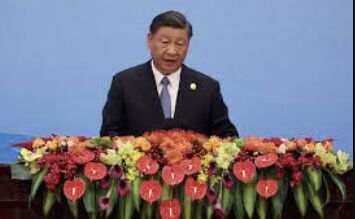President Xi Jinping Makes Surprise Visit to Chinese Central Bank, Signaling China's Commitment to Economic Stability
Chinese President Xi Jinping recently made a surprise visit to the People's Bank of China and the State Administration of Foreign Exchange in Beijing. The purpose of the visit remains unclear, but it underscores the government's focus on strengthening the economy and financial markets. The visit comes at a crucial time as China faces headwinds and challenges, including concerns about weak private sector activity and the need for long-term reforms. The central bank has been implementing modest interest rate cuts and injecting more liquidity, but analysts believe further easing may be limited due to fears of capital flight. President Xi's visit signals China's determination to bolster its economy and address ongoing uncertainties.
Chinese President Xi Jinping, along with Vice Premier He Lifeng and other government officials, recently made a surprise visit to the People's Bank of China (PBOC) and the State Administration of Foreign Exchange (SAFE) in Beijing. This marks Xi's first known visit to the central bank since he became president a decade ago, and it comes at a crucial time for China's economy and financial markets.
The purpose of the visit remains unclear, and both the PBOC and SAFE have not commented on the matter. However, this visit highlights the government's increasing focus on shoring up the economy and financial markets as they face headwinds and challenges. China's economy, the world's second-largest, grew faster than expected in the third quarter. However, there are concerns about continued weakness in private sector activity and the need for long-term reforms to shift the economy towards consumer-led growth. The PBOC has been implementing modest interest rate cuts and injecting more liquidity into the economy in recent weeks.
However, analysts believe that the central bank is limited in its ability to further ease monetary policy due to the fear of capital flight and the potential negative impact on the yuan. Capital outflows from China have been on the rise, reaching $75 billion in September, the highest monthly figure since 2016. This underscores the pressure on the yuan and the need for measures to stabilize the currency.
In addition to the central bank visit, Vice Premier He Lifeng also visited the nation's sovereign wealth fund, indicating a comprehensive effort by the government to address economic and financial challenges. Overall, President Xi's surprise visit to the central bank and related institutions signals China's determination to bolster its economy and financial markets amidst ongoing uncertainties. This move reflects the government's recognition of the importance of robust monetary policies and reforms to ensure sustainable growth and stability in the country.




